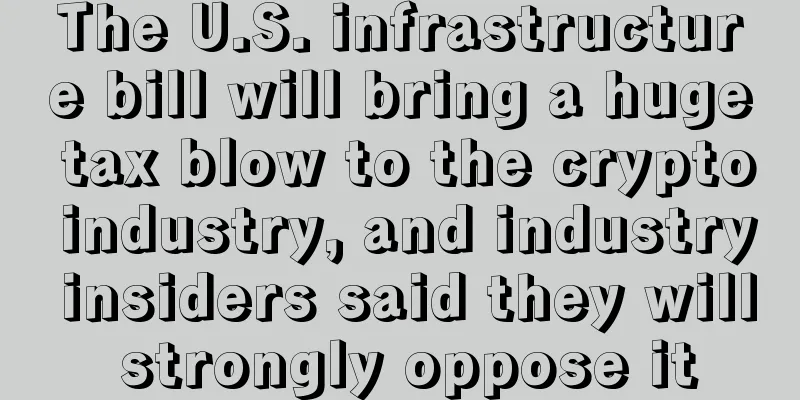The U.S. infrastructure bill will bring a huge tax blow to the crypto industry, and industry insiders said they will strongly oppose it

|
Written by Kellie Mejdrich and Brian Faler, Politico reporters; Translated by Zhan Juan Buried in a yet-to-be-released bipartisan infrastructure package is a sweeping crackdown on cryptocurrency trading that could generate a massive tax bonanza for the U.S. government and cause severe anxiety for a financial technology industry that has boomed during the coronavirus pandemic. U.S. lawmakers want people who trade bitcoin and other digital assets to be subject to reporting rules similar to those that govern sales of stocks and other securities: brokers would be required to report information such as how much people paid for cryptocurrencies. The proposal has worried many in the cryptocurrency industry, who fear they will be saddled with a slew of new regulations that could last for years. They believe new reporting requirements could hurt the economic viability of the cryptocurrency market, which has seen a rapid increase in new users during the pandemic. Given the size of the tax revenue that could be raised from the new bill and the progress that has already been made, many believe that the relevant provisions in the bill may not be completely repealed, so they are focusing on making small improvements wherever possible. Industry groups including the Blockchain Association, Coin Center and the Association for Digital Asset Markets issued a statement outlining their opposition to the requirements, specifically pointing to provisions in the draft that could lead to the targeting of individual users. Perianne Boring, founder and president of the Chamber of Digital Commerce, said in an interview on Friday that her organization has proposed changing the bill language to tighten the definition of brokerage activities to exclude cryptocurrency miners and operators of decentralized finance (DeFi) platforms. “Shoehorning this idea into a congressional charter or generating revenue for something completely unrelated is not the preferred way or the right way to advance the best policy,” Bohn said. She noted that the Digital Asset Market Association and others have repeatedly asked the IRS for more guidance on how to enforce existing law. Michelle Bond, CEO of the Digital Asset Market Association, said: “It is critical for the industry to provide technical assistance for a proposal of this scale.” Tax compliance is considered a major issue for cryptocurrencies, and lawmakers are keen to win as they expect the proposal to collect $28 billion in taxes (from the cryptocurrency industry) to fund their massive spending plans. But the issue is complex, potentially affecting banking and securities laws. It also spans the jurisdiction of Congress, from the tax committee to the banking committee. The move to strengthen cryptocurrency reporting requirements comes after Republicans rejected a plan to beef up IRS enforcement by significantly increasing its budget — an issue Democrats are expected to address in a separate tax settlement. IRS Commissioner Charles Rettig has repeatedly asked lawmakers to give him more power to improve tax compliance in the cryptocurrency industry, where many market participants are unaware of their obligations or engage in outright illegal behavior. While cryptocurrency industry executives have vowed to fight the proposals, they may face an uphill battle. The plan is heading for a quick vote in the U.S. Senate, where lawmakers have been struggling for weeks over how to pay for it and are clearly unwilling to see an infrastructure proposal fall by the wayside. The fact that few U.S. lawmakers understand cryptocurrencies and how they relate to taxation means any lobbying will require a massive education campaign. The most professional member of Congress on the issue, Republican Senator Rob Portman of Ohio, happens to be one of the lead authors of the broader infrastructure package. Drew Nirenberg, a spokesman for Portman, said in a statement: "This legislative provision does not redefine digital assets or cryptocurrencies as 'bonds' for tax purposes, does not call into question the privacy of individual cryptocurrency holders, and does not force non-brokers such as software developers and cryptocurrency miners to comply with IRS reporting obligations. It simply clarifies that any person or entity acting as a broker, facilitating transactions for clients and collecting cash, must comply with standard information reporting obligations." Much of the proposal mirrors the reporting requirements people are required to implement when they sell stock in companies like Apple or Ford. Brokers will be required to report clients’ so-called “basis,” the price at which they bought cryptocurrencies, as well as their total gains — making it much easier to calculate their tax bills. Research has long shown that people are less likely to dodge their tax obligations when they know someone else will report their income to the IRS. U.S. lawmakers also want to include anti-money laundering provisions required by the Treasury Department, requiring transactions worth more than $10,000 to be reported to the government. Behind the scenes, lawmakers debated whether the definition of a broker should be expanded to include decentralized exchanges (without traditional middlemen) and peer-to-peer trading, though some said the proposal’s language was broad enough to cover other sectors, such as cryptocurrency miners. “It’s really striking how broadly the definition of ‘broker’ has been expanded,” said Lisa Zarlenga, a partner at Steptoe & Johnson LLP who studies cryptocurrency tax issues. Another source of controversy is that the terms could extend beyond cryptocurrencies to other types of digital assets, such as NFTs (non-fungible tokens). The U.S. Treasury Department has been developing rules to tighten reporting requirements for brokers such as Coinbase, but with the signature of Congress, the Treasury Department will not have to worry about any potential legal challenges when issuing new regulations in the future. Industry executives vowed a fight. Kristin Smith, executive director of the Blockchain Association, expressed frustration with the last-minute rush to draft the legislation, saying it could impose new requirements on “all the different players in the ecosystem.” “We think that this could drive a lot of the players, businesses and individuals involved in the crypto space to go overseas, which could really stifle innovation in the crypto space in the United States,” she said. Although the plan would reportedly raise $28 billion in taxes, that figure was highly uncertain and the estimate immediately raised eyebrows. While congressional budget staff are generally pretty good at predicting the costs of established tax changes, such as expanding the child tax credit, they are having trouble predicting the costs of more novel policy proposals. Cryptocurrencies face a particularly daunting challenge because their valuations can fluctuate wildly, it’s hard to know how many people are buying and selling the assets, and forecasters would have to guess at the tax rates they might pay. |
<<: Bank of America Believes Bitcoin Adoption in El Salvador Could Increase Disposable Income
>>: Hard Drive Mining Still Lurks in Data Centers
Recommend
The Moon in the House of Marriage_Physiognomy Analysis
The Moon has a humble personality, is kind to oth...
What does a mole on the foot mean?
Many people feel unsightly because of the black m...
What if there is no destiny line?
Some people have no destiny line , while some peo...
Frequently forgetful facial features
Many times, some people tend to lose things easil...
Twitter celebrity questioned Huobi's misappropriation of client assets. What is the truth behind it?
What is the current situation after Huobi’s layof...
Central bank digital currencies could be the next step in the evolution of money, says BIS report
According to BlockBeats, the Bank for Internation...
On-chain Scaling Conference - The Future of Bitcoin
Effective immediately: On-chain Scaling Conferenc...
The face of a man without dominance
The face of a man without dominance As for the wo...
Which men look kind but are cruel and violent?
What women hope for is to find a good husband and...
How to read a man's ears
The ear is one of the five sense organs, and is c...
Do people with diamond-shaped faces live longer?
If a person has a diamond-shaped face, it will be...
How to tell fortune by looking at the lines on a man's left hand
From the lines on the palm, you can accurately ju...
Is double eyelid a very precious face? What is the fate?
Many people want to have a very noble face. Such ...
The person with a tolerant character will digest the grievances by himself.
Some people have very dull personalities. They us...
The filecoin space race officially started on August 25th, Beijing time!!!
The filecoin space race officially started on Aug...









